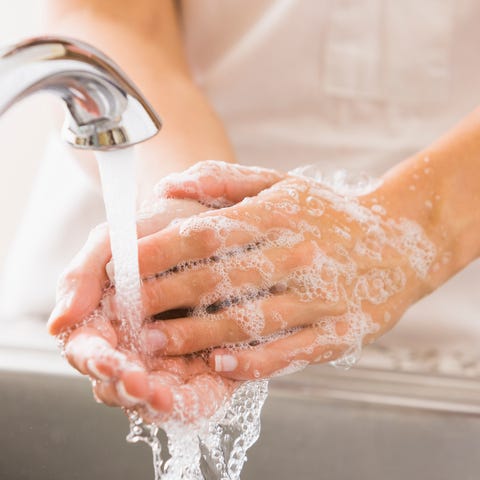Virus Control Hygiene : Doing It Right
"With this coronavirus, there are nuances we don't understand yet. I understand why people are nervous."
"[We've passed the point of containment which has taken us to the point of mitigation.] We have to go back to things that are tried and true, and that work well. It's a fairly limited list. We need to use things that work."
"As long as you get a good build-up of suds [in vigorously hand-washing] you will be able to inactivate anything that's on the surface."
Jason Kindrachuk, medical microbiologist, Canada Research Chair in molecular Pathogenesis of Emerging and Re-Emerging Viruses, University of Manitoba
 |
So, from an expert distinguished for his professional capability and knowledge, here's advice from a scientist who leads a team of other scientists researching biological mechanisms of emerging and re-emerging viruses. Needless to say, in their line of work it is imperative that the laboratory where they carry out their experiments and research be impeccably clean. What works for them will most certainly work anywhere -- and soap and water is what Dr.Kindrachuk identifies as the most efficient defence in achieving optimum hygiene.
 |
High-touch surfaces should be cleansed frequently with normal household cleaners or with diluted bleach. Items to be cleaned include toys, toilets, phones, electronics, door handles, bedside tables and television remotes. In the right proportions, diluted bleach is quite effective; a solution of 10 percent bleach to 90 percent water renders just about anything inactive. "It's hell on surfaces, but works really, really well", adds Dr.Kindrachuk.
Sodium hypochlorite is the active ingredient in household bleach, normally available in the range of three to six percent, listed on the label ingredients; a safe concentration to inactivate the novel coronavirus is suggested at 0.1 to 0.5 percent sodium hypochlorite. Household bleach in a one-in-10 dilution would provide a solution in the range of 0.3 to 0.6 percent for disinfecting: "We use this on stainless steel surfaces in our lab, but follow that up with our 70 percent ethanol solution in recognition of the potential damage of bleach to the surface. This is definitely overkill for household cleaning given that bleach is something you don't want to have copious amounts of on your skin or sitting around on surfaces."
The best bet remains the use of liquid dishwashing soap to clean surfaces "It will do the trick", the expert repeated. Alcohol is another cleaning source for viruses since they're susceptible to its use with a concentration of at least 60 percent, though 70 percent ethanol is what is used by the lab. "The European Centre for Disease Prevention and Control has an excellent document on this. They recommend 70 percent ethanol or 50 percent isopropranol, specifically for coronaviruses. This range of alcohol concentrations also worked well for non-enveloped viruses like noroviruses, which are more stable than their enveloped counterparts."
 |
| Stop touching your face |
When purchasing hand sanitizer look at the ingredient list to ensure a 60 percent or higher alcohol content, as recommended by the Centres for Disease Control. Then again, liquid soap remains the far superior product and the best investment, as far as Dr.Kindrachuk is concerned, pointing out that sanitizers work only on surfaces already clean, while soap and water will cut through oil and grease on skin.
"Viruses do not last that long outside. Viruses don't last long in cold environments" stated Ontario's Chief Medical Officer of Health, Dr.David Williams. In sub-zero temperatures, viruses are inactivated; they freeze and the virus's outer layer breaks apart. A mild spring will also do the trick, for when it's warm a virus's fatty protective covering disintegrates. Still, this novel coronavirus has not yet released all its dastardly attributes to scientists and Dr.Kindrachuk feels it's too early to say if coronavirus will respond to cold and warmth in the same way as other viruses.
Even UV light which can inactivate various pathogens; even exposure to sunlight, cannot be guaranteed with the novel coronavirus until more is known.
 |
| If you've got a touchscreen in your car, clean it frequently. |


0 Comments:
Post a Comment
<< Home